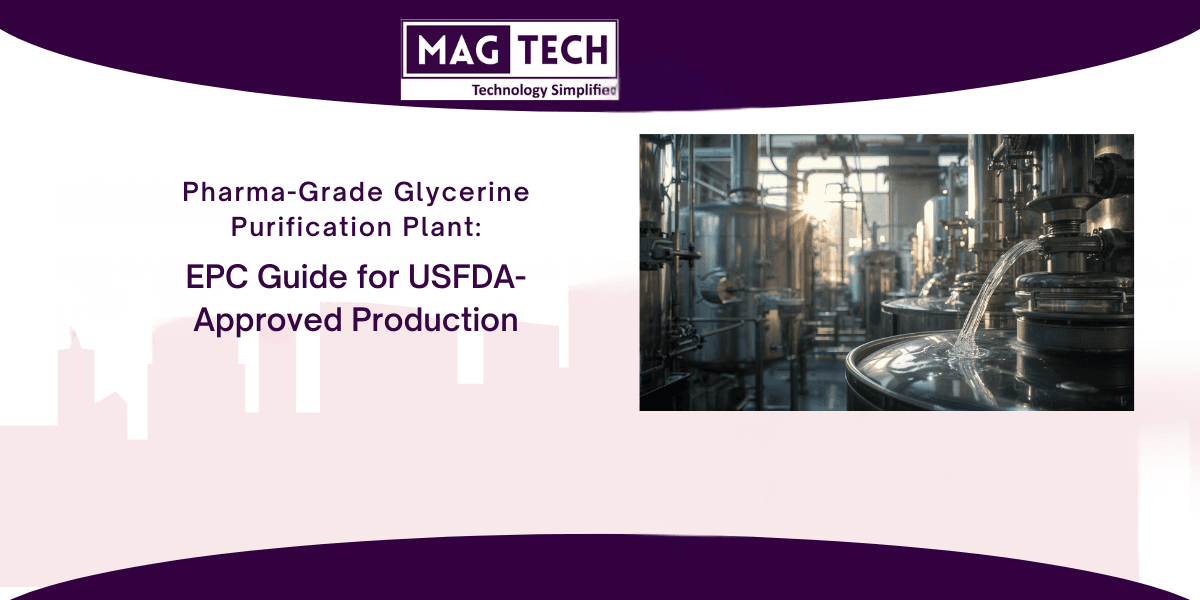India, as one of the fastest-growing economies in the world, has a strong energy demand that continues to escalate with its economic and population growth. The landscape is evolving with the integration of biodiesel plant in India, adding a new dimension to India’s energy dynamics.
The biodiesel industry in India is still in its nascent stages. In recent years, however, it has shown significant potential due to the rising awareness of sustainable and cleaner fuel alternatives. This renewable and biodegradable fuel is manufactured domestically from vegetable oils, animal fats, or recycled restaurant grease.
Given India’s vast agricultural abundance, there is a substantial availability of raw materials that can be tapped for biodiesel production. The government’s push towards biofuels, as exhibited through various policies and initiatives,
aims to augment the biodiesel blend in conventional diesel to reduce dependency on imported
crude oil and promote environmental sustainability.
Table of Contents
ToggleBenefits of Starting a Biodiesel Plant in India
Starting a biodiesel plant in India offers multiple benefits:
● Biodiesel produces fewer pollutants compared to fossil fuels, thus reducing pollution and improving air quality.
● With the government encouraging biodiesel production, there are financial incentives, subsidies, and support available for entrepreneurs and businesses in this sector.
● India can reduce its dependency on imported crude oil by producing biodiesel.
● Utilizing crops and agricultural residues for biodiesel production can provide an additional
revenue stream for farmers, thus boosting the rural economy.
● Establishing biodiesel plants in India can generate various direct and indirect job opportunities in both urban and rural areas.
Steps To Start a Biodiesel Plant In India
With the help of the following steps, you can establish a thriving biodiesel production business in India.
Market Research and Feasibility Study
Begin by examining the biodiesel market, focusing on demand analysis and potential customers. Explore the common sources for feedstocks, such as used cooking oils or non-edible oil crops, and calculate their availability and cost. This will provide a clear picture of the raw materials you will need and their procurement costs.
Another crucial aspect is understanding the regulations around biodiesel production and sales in India. You should investigate environmental laws, business operations, and specific industry
requirements.
Accurate knowledge of legal and market conditions will also help you align your business operations with legal standards and customer expectations.
Business Plan and Financial Modeling
The business plan proves invaluable in communicating your vision to potential investors and stakeholders.
So, draft a detailed business plan that outlines your business goals, operational structure, and strategies for market entry. This document should cover all aspects, from plant operations to management hierarchy and projected financials.
Similarly, the financial model should highlight the startup costs, operational expenses, and potential revenue. This involves performing break-even analysis, profitability forecasts, and risk assessments.
Remember, proper financial planning ensures you secure adequate funding and manage finances wisely throughout the lifecycle of your business.
Obtain Necessary Licenses and Approvals
Before you begin operations, you need to obtain the right licenses and permits. The requirements can vary based on your location. Typically, they include a broad business license, specific permits related to biofuel production, and local approvals if your operation affects local resources. Also, since biodiesel production can affect the environment, it’s important to comply with environmental laws.
To get these permits, submit your business plans and any environmental impact assessments to the local government or regulatory bodies.
In India, for example, you must follow the Environmental Protection Act. This might involve getting approvals from the Pollution Control Board to ensure your plant doesn’t negatively impact the environment. Regular audits can help you stay compliant.
Running a biodiesel plant also comes with certain risks, especially to workers handling chemicals or machinery. Therefore, it’s crucial to follow health and safety guidelines, which may involve training employees, providing safety gear, and setting up emergency protocols.
Following these rules helps keep everyone safe and can also keep your operations running smoothly. Each certification ensures your business complies with all regulations, which will help you avoid legal troubles in the long run.
Site Selection and Plant Design
Choosing the right location for your biodiesel plant in India is critical. An ideal location would be accessible to both suppliers of feedstocks and potential markets for selling biodiesel. Consider factors such as –
● Proximity to Raw Materials
India’s diverse agrarian base offers abundant raw materials for biodiesel production, such as non-edible oils from Jatropha and Pongamia pinnata, as well as waste vegetable oil from urban centers. Selecting a site close to these raw material hotspots reduces transportation costs and carbon footprints.
● Transportation Links
Essential for both raw material inputs and finished biodiesel outputs, access to robust transportation networks like highways, railways, and ports is crucial. Such connectivity ensures swift distribution across diverse markets, from local consumption to potential exports.
● Utility Access
Essential utilities, including water for processing and electricity for operations, must be readily available. Sites near power grids and water supplies would be ideal to minimize infrastructure investment and ongoing costs.
● Regulatory Framework
Understanding local regulations concerning land use, environmental impact, and support for renewable energy initiatives is important. Some regions offer incentives for renewable energy projects, which can significantly affect the viability and profitability of the project.
● Community Engagement
A plant can only function optimally with local community support. Engaging with local communities early in the process to discuss job creation and environmental impacts can smooth the way for smoother operations and sustainable community relations.
Design of the Biodiesel Plant
Once the site is finalized, designing the plant is the next step. The layout should optimize the manufacturing process flow while also ensuring safety and environmental compliance. Engage with experts in industrial plant design to create a setup that maximizes productivity while minimizing costs and potential risks.
● Process Flow Optimization
An ideal plant layout should facilitate a seamless flow from raw material receipt and storage, through processing, to storage of the finished biodiesel. This smooth flow minimizes cross-contamination and reduces handling.
● Safety Protocols
Biodiesel production involves flammable materials and chemicals. Hence, comprehensive safety installations, including fire suppression systems and proper waste disposal mechanisms are mandatory to meet safety standards and protect the plant infrastructure and personnel.
● Sustainability Practices
Incorporating waste recycling and water management systems can greatly enhance the sustainability of a biodiesel plant.
Processes like using by-product glycerin from biodiesel production and implementing rainwater harvesting and wastewater treatment can maximize resource efficiency.
● Technology Integration
Utilizing cutting-edge technology for process monitoring and control can lead to significant increases in efficiency and product quality. Automation can also reduce operational costs and minimize human error, promoting a safer working environment.
● Scalability and Flexibility
The design should not only meet current needs but also allow for future expansion and flexibility in production capacity. This is crucial to scale operations or shift production parameters in response to market or raw material availability changes.
Selecting the Technology and Machinery
Selecting the appropriate technology for converting feedstock into biodiesel is fundamental. You might choose to purchase existing technology or develop a new one depending on your operational needs and budget.
Suitable machinery, such as reactors, separators, and storage tanks, must also be sourced. It’s also essential to select the right technology and equipment tailored to your production needs. This includes choosing an effective transesterification system, as well as systems for oil extraction if utilizing natural raw materials.
The equipment must also include purification systems to ensure the biodiesel meets requisite quality standards. In addition, it should have systems for methanol recovery to enhance sustainability by recycling methanol and minimizing waste.
Also, decide whether to buy new machinery or use refurbished equipment based on budget constraints and availability. New equipment may offer long-term reliability but at a higher cost, while used equipment can save money upfront but may require more maintenance.
Nevertheless, It is important to ensure that the equipment can handle different types of feedstocks and be scalable to accommodate future production increases without significant additional investment.
Infrastructure Design and Layout Planning
The planning of a biodiesel plant’s infrastructure is a critical step that involves optimizing the facility’s design for efficient workflow and safety. It’s important to ensure a coherent flow that linearly processes from the input of raw materials, through production, to the output of biodiesel and storage.
Compliance with local zoning, safety, and environmental regulations is crucial in plant design to ensure the operation does not face legal challenges. Designs should also factor in the potential for future growth as it will allow the plant to expand its
operations seamlessly as demand increases.
Raw Material Acquisition and Supply Chain Efficiency
For consistent production of biodiesel, a steady and reliable source of raw materials is fundamental.
Whether the raw materials are vegetable oils, recycled greases, or animal-based fats, securing cost-effective and steady supplies is crucial. This entails cultivating strong and lasting relationships with diverse suppliers to avoid disruptions in raw material availability.
Furthermore, efficient supply chain management that covers strategic reserves and adept handling of logistics is of utmost importance. This ensures that materials are transported and stored in a way that balances costimeliness, and environmental considerations.
Setup and Installation
Construct the necessary infrastructure for your biodiesel plant in India and install the machinery. This process should be managed by skilled personnel to ensure correct setup and operational functionality. At this stage, it’s essential to organize utilities like power, water, and waste disposal systems.
Testing all installations for safety and operational integrity is also equally important. Ensuring that everything is installed as per the design specifications will prevent operational disruptions and maintain safety standards.
Recruitment and Training
The success of the plant largely depends on the competence of its personnel. Hire experienced engineers, operators, and administrative staff who can contribute to smooth plant operations. Prioritize individuals with industry experience and a good work ethic.
Once the team is assembled, a thorough training program needs to be implemented. Training should cover operational procedures, safety protocols, and emergency responses. Well-trained employees will ensure the plant operates efficiently and safely.
Trial Runs
Carry out initial testing phases or trial runs to ensure all systems function correctly. These trials help identify any shortcomings in the production process. Adjustments can be made before full-scale production begins to ensure quality and efficiency standards are met. The performance of equipment and the quality of biodiesel produced during these trials should be closely monitored. This step is crucial for fine-tuning operational parameters and training staff on
handling real production scenarios.
Commence Full-scale Production
Once all systems are optimized, begin full-scale production. Monitor the operation closely during the early stages to ensure everything runs smoothly, and adjust operational strategies as necessary based on initial outputs and performance.
You must also continuously evaluate the production process and implement improvements to enhance yield, reduce costs, or increase efficiency. Regular monitoring and adaptation to new challenges will ultimately lead you to successful actions. Marketing and Sales Developing an effective marketing strategy is crucial for promoting the advantages of biodiesel
and pinpointing target markets. It’s important to establish a distribution network that ensures efficient and prompt delivery to customers, enhancing reliability.
Focus on building relationships with customers and understanding their needs. Customer feedback can drive improvements in product offerings and service quality. Effective marketing will increase demand and help the company expand its market presence.
Sustainability and Expansion
Continued success requires adapting to changes in market conditions and customer preferences. Hence, after establishing the business, focus on sustainable practices and customer feedback to adapt your business model. This may include increasing production capacity or diversifying the product range to meet broader market needs.
Consider technological upgrades, efficiency enhancements, and potential new markets for expansion. Growth should be managed carefully to maintain quality and environmental standards. Making the Most Out of the Sustainable Business Opportunity Starting a biodiesel plant in India provides a promising opportunity for entrepreneurs seeking to make a significant impact in the renewable energy sector.
As the economy grows and the awareness of environmental issues increases, the demand for sustainable alternatives like biodiesel is expected to rise. Hence, by establishing a biodiesel plant, you are not only contributing to the diversification of energy resources in India but also supporting the global movement towards reducing carbon footprints.
Your success in this field can inspire further innovation and encourage more sustainable practices within the industry, thus shifting India closer to its energy self-sufficiency and sustainability goals.
Contact us for expert consultancy on biodiesel plant business .


